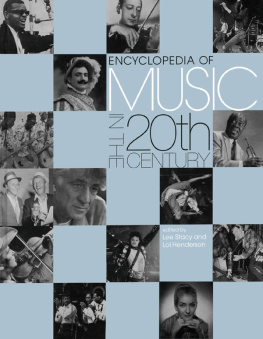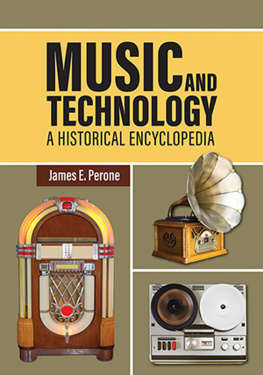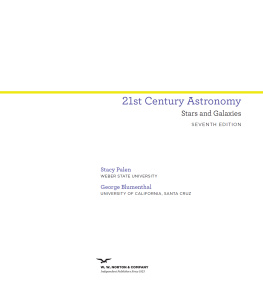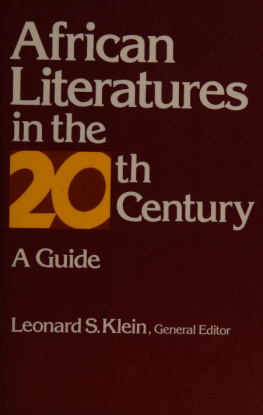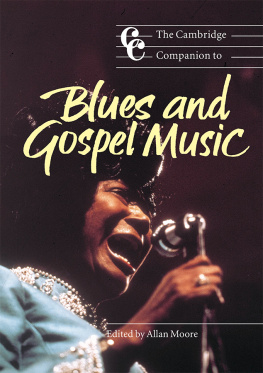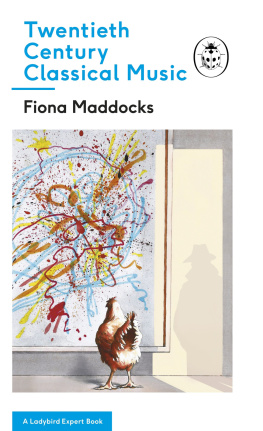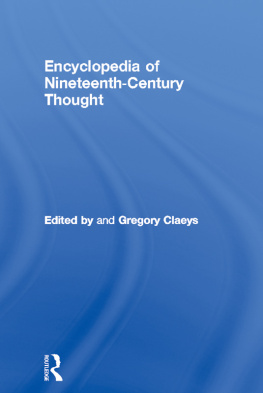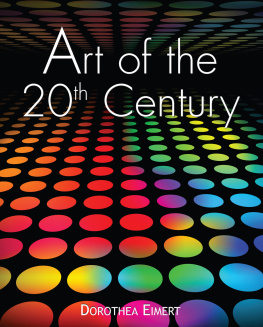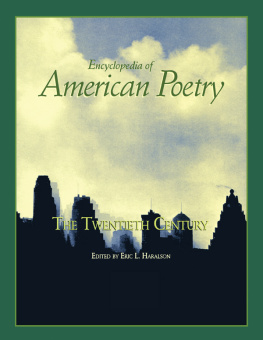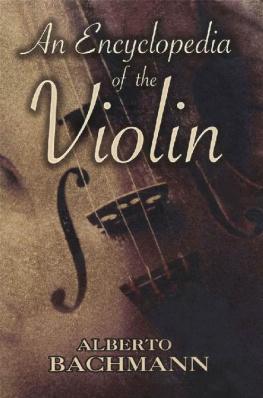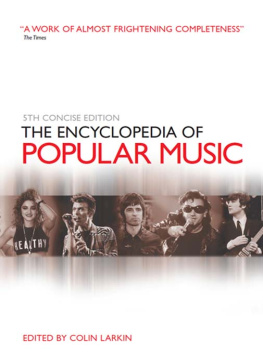Stacy Lee - Encyclopedia of Music in the 20th Century
Here you can read online Stacy Lee - Encyclopedia of Music in the 20th Century full text of the book (entire story) in english for free. Download pdf and epub, get meaning, cover and reviews about this ebook. City: London;Chicago, year: 1999, publisher: Taylor and Francis;Fitzroy Dearborn, genre: Home and family. Description of the work, (preface) as well as reviews are available. Best literature library LitArk.com created for fans of good reading and offers a wide selection of genres:
Romance novel
Science fiction
Adventure
Detective
Science
History
Home and family
Prose
Art
Politics
Computer
Non-fiction
Religion
Business
Children
Humor
Choose a favorite category and find really read worthwhile books. Enjoy immersion in the world of imagination, feel the emotions of the characters or learn something new for yourself, make an fascinating discovery.
- Book:Encyclopedia of Music in the 20th Century
- Author:
- Publisher:Taylor and Francis;Fitzroy Dearborn
- Genre:
- Year:1999
- City:London;Chicago
- Rating:4 / 5
- Favourites:Add to favourites
- Your mark:
- 80
- 1
- 2
- 3
- 4
- 5
Encyclopedia of Music in the 20th Century: summary, description and annotation
We offer to read an annotation, description, summary or preface (depends on what the author of the book "Encyclopedia of Music in the 20th Century" wrote himself). If you haven't found the necessary information about the book — write in the comments, we will try to find it.
Stacy Lee: author's other books
Who wrote Encyclopedia of Music in the 20th Century? Find out the surname, the name of the author of the book and a list of all author's works by series.
Encyclopedia of Music in the 20th Century — read online for free the complete book (whole text) full work
Below is the text of the book, divided by pages. System saving the place of the last page read, allows you to conveniently read the book "Encyclopedia of Music in the 20th Century" online for free, without having to search again every time where you left off. Put a bookmark, and you can go to the page where you finished reading at any time.
Font size:
Interval:
Bookmark:
MUSIC
IN THE 20TH CENTURY
edited by Lee Stacy and Lol Henderson

Fitzroy Dearborn
M.E. Sharpe, Inc., 1999
All rights reserved, including the right of reproduction in whole or in part in any form.
First published in 1999
by Fitzroy Dearborn
This edition published 2013 by Roudedge
2 Park Square, Milton Park, Abingdon, Oxon OX14 4RN
711 Third Avenue, New York, NY 10017
Routledge is an imprint of the Taylor & Francis Group, an informa business
British library Cataloguing in
Publication Data
Encyclopedia of music in the 20th century
1. Music 20th century Encyclopedia
I. Stacy, Lee II. Henderson, Lol
780.90403
ISBN 1-57958-079-3
Developed by Brown Partworks Limited
London
Cover designed by Philip Lewis
I n the 20th century, music began to realise its potential as the most universal medium of communication. Music is a way of transmitting and reflecting emotion. Of all the art forms, music may be the most difficult to describe in words, but perhaps because of this, it is also the one that most easily transcends barriers of nationality and language. This encyclopedia looks at how music, in all its rich variety, has become part of the daily life of most of humankind, and how the international and mass appeal of music has changed its form forever. In the process, it helps us understand this unique feature of modern life.
At the dawn of the 20th century, many different types of music, from Andean folk songs to Wagnerian opera, had little or no effect on each other, and were often unknown outside of their immediate audiences. By the end of the 20th century, however, a global network had developed in which new, hybrid forms of music appeared. Boundaries that once seemed impenetrable are now crossed regularly: for example, the Indonesian gamelan influences Western concert music, Arabic instruments influence salsa, and classical composers write for rock bands without apology.
Technology is the prime reason for this important change. As soon as music could be sent over the air waves, then barriers began to be broken down. This process was carried even further as recording technology allowed individuals to listen to a performance in their own homes. Before the advent of radio and the phonograph, the only way of learning about music was by studying at the feet of a master musician, or by reading complex scores that in themselves took years of study to decipher. Listening was always a social experience, as music could only be heard when played live by musicians. The radio and sound recording have changed all that. Now an individual sitting alone in a room can listen over and over to the most profound orchestral masterpiece. In the world of rock, the Beatles reached a global audience and paved the way for the world domination of rock music with less than half a dozen three-minute tracks.
The Encyclopedia of Music in the 20th Century provides a guide to the most important musical devel-opments of the past 100 years, and encompasses this broad field of musical invention without intimidating the non-specialist user. Each entry has been written by a musicologist or journalist expert in the field, but in a style that can be understood by students of music at all levels and by anyone interested in this multifaceted subject. The entries cover all the major genres, styles, techniques, composers, and performers who make up this rich, varied world of artistic expression. They look at how musical styles have developed, both within their own context and within the context of a changing world, from Electronic Music to Zouk; from Abba to Anton Webern; from Joan Baez to Arturo Toscanini.
The main part of the encyclopedia is arranged alphabetically, with entries on important genres, forms, technical developments, and national styles of music, and on individuals who have made the most significant contributions to music in this period. Words that appear in small capitals (e.g., MADONNA) in the article text or at the end of the article under SEE ALSO refer to articles found elsewhere in the encyclopedia. Each article also ends with further readings and a list of suggested listening that highlights the most relevant musical pieces.
Following the main A-Z section, the reader will find a biographical digest of over 1,000 entries. This special section provides concise biographies of the individuals or groups who have made major contributions to music in the 20th century, but have not been allotted a main entry.
I n the 1970s, Swedish pop group Abba replaced the BEATLES as the worlds most popular entertainers. They had extraordinary chart success, and their deceptively simple, slick (some would say bland) music, conceals their quite exceptional songwriting and production skills.
Formed in 1972, Abba included Benny Andersson (b. December 1946), keyboards and synthesizer; Bjorn Ulvaeus (b. April 1945), guitar; Agnetha Faltskog (b. April 1950), vocals; and Fridaa single stage name(b. Anni-Frid Lyngstad, November 1945), vocals. Abba was an acronym formed from the first-name initial of each member.
In 1974, Abba made an instant international impact : with Waterloo, Swedens winning entry in the Eurovision song contest. The song was a No. 1 hit in the U.K. singles charts and, surprisingly for a Eurovision entry, also reached No. 6 in the U.S. Thus began the bands brilliant run through the worlds pop charts with songs such as S.O.S., Money, Money, Money, Super Trooper, and Dancing Queen. In Britain, the group enjoyed spectacular success, with eight successive No. 1 albums from 1976 to 1982. Success in America was far less dramaticin addition to Waterloo only Dancing Queen reached the Top 10. Nevertheless, by 1979 Abba had sold more records than any other group, including the Beatles, worldwide.
The common ingredients for the perfect Abba song were an infectious, sometimes haunting, melody, immaculate counter-harmonies, and, above all, supreme attention to production details. Their nationality was also part of Abbas appeal. A British or American act may have been too self-conscious to mouth some of their unsophisticated, even mawkish, lyrics. Their background in Swedish folk music ensured that Abba never forgot the importance of melody at a time when many rock bands were exploring complex electronic effects and obscure lyrics. The group was at its most creative when dealing in everyday gloom. Sad and graceful songs such as Knowing Me, Knowing You, and The Winner Takes It All saw them create hit singles out of the desolation of failed relationships (Bjorn and Agnetha, and Benny and Frida were married couples who divorced during their days as Abba).
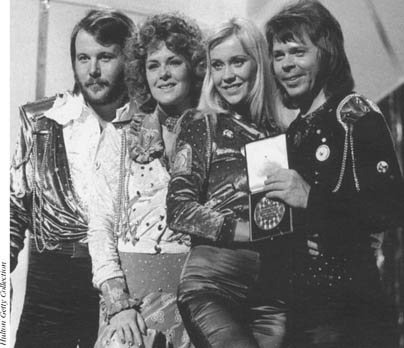
The Abba line-up (left to right): Benny, Frida, Agnetha, and Bjorn. Their well-constructed songs and unique fashion sense dominated the worlds pop scene in the late 1970s.
Abba disbanded in 1982 and Agnetha and Frida attempted solo careers, but failed. Bjorn and Bennys songwriting talents proved more enduring, notably in their collaboration with lyricist Tim Rice on the musical Chess (1986). The groups afterlife, however, began in the early 1990s when disco glamour was in vogue, and the Abba Gold album (1992) sold millions of copies.
Graham McColl
SEE ALSO:
.
FURTHER READING
Edgington, H., and P. Himmelstrand. Abba (London: Magnum Books, 1978);
Tobler, John. ABBA Gold: The Complete Story (New York: St. Martins Press, 1993).
Font size:
Interval:
Bookmark:
Similar books «Encyclopedia of Music in the 20th Century»
Look at similar books to Encyclopedia of Music in the 20th Century. We have selected literature similar in name and meaning in the hope of providing readers with more options to find new, interesting, not yet read works.
Discussion, reviews of the book Encyclopedia of Music in the 20th Century and just readers' own opinions. Leave your comments, write what you think about the work, its meaning or the main characters. Specify what exactly you liked and what you didn't like, and why you think so.

